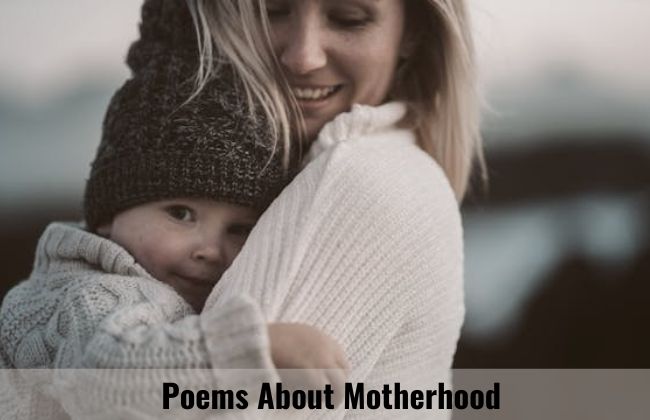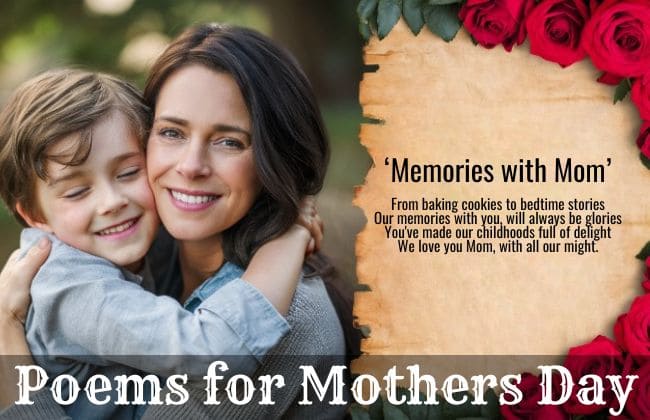The relationship between a mother and a daughter is an indescribable bond, filled with love, teachings, and complicity that transcends generations.

It is a connection built with understanding glances, healing hugs, and words that, although brief, deeply touch the heart.
In this unique exchange of experiences, poetry emerges as a powerful channel to express feelings that sometimes common words cannot describe.
Poems dedicated to the mother-daughter relationship are a beautiful way to capture the essence of this sacred bond.
Each verse is a testament to the shared moments, learned lessons, and challenges overcome together.
In this post, we will share a selection of touching poems that celebrate the eternal bond between mother and daughter. Allow yourself to feel the depth of this love in each word.
Table of Contents
- 1 1) “A Mother’s Love” by Helen Steiner Rice
- 2 2) “Mother to Son” by Langston Hughes
- 3 3) “To My Mother” by Christina Rossetti
- 4 4) Morning Song by Sylvia Plath
- 5 5) “First Fall” by Maggie Smith
- 6 6) ‘My Mother’ by Ann Taylor
- 7 7) “The Raincoat” by Ada Limón
- 8 8) “The Daughter” by Carmen Giménez
- 9 9) “Pheidippedes’ Daughter” by Gillian Clarke
- 10 10) ‘Mother’ by Lola Ridge
- 11 Themes in Mother Daughter Poems
1) “A Mother’s Love” by Helen Steiner Rice
Helen Steiner Rice captures the timeless essence of maternal affection in her poem “A Mother’s Love.”
This piece eloquently describes the depth of a mother’s love with a profound simplicity that resonates across generations.
Rice’s depiction is built around themes of sacrifice, unyielding devotion, and an enduring nature that withstands even the most challenging circumstances.
The emotional strength depicted in the lines suggests that a mother’s love persists in the face of any adversity.
A Mother's love is something
that no on can explain,
It is made of deep devotion
and of sacrifice and pain,
It is endless and unselfish
and enduring come what may
For nothing can destroy it
or take that love away . . .
It is patient and forgiving
when all others are forsaking,
And it never fails or falters
even though the heart is breaking . . .
It believes beyond believing
when the world around condemns,
And it glows with all the beauty
of the rarest, brightest gems . . .
It is far beyond defining,
it defies all explanation,
And it still remains a secret
like the mysteries of creation . . .
A many splendored miracle
man cannot understand
And another wondrous evidence
of God's tender guiding hand.
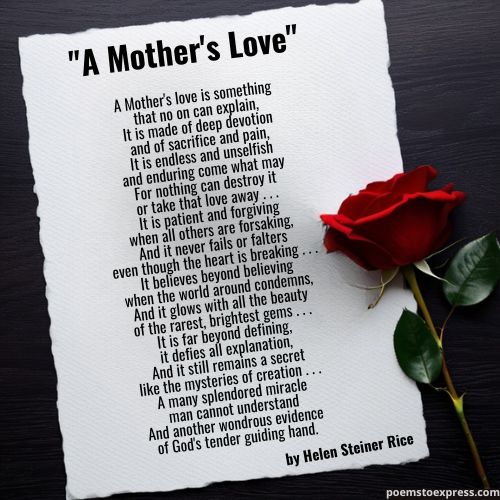
2) “Mother to Son” by Langston Hughes
“Mother to Son” is a poignant poem by Langston Hughes that encapsulates the hardships and resilience in the journey of life, particularly from a mother’s perspective as she addresses her son.
Published in 1922, the poem uses the metaphor of a staircase to symbolize life’s difficult path.
The mother describes her life as being no “crystal stair,” but one filled with obstacles like “tacks,” “splinters,” and “boards torn up,” conveying struggles and pain.
Well, son, I’ll tell you:
Life for me ain’t been no crystal stair.
It’s had tacks in it,
And splinters,
And boards torn up,
And places with no carpet on the floor—
Bare.
But all the time
I’se been a-climbin’ on,
And reachin’ landin’s,
And turnin’ corners,
And sometimes goin’ in the dark
Where there ain’t been no light.
So boy, don’t you turn back.
Don’t you set down on the steps
’Cause you finds it’s kinder hard.
Don’t you fall now—
For I’se still goin’, honey,
I’se still climbin’,
And life for me ain’t been no crystal stair.
3) “To My Mother” by Christina Rossetti
The poem “To My Mother” by Christina Rossetti is a tender and heartfelt expression of love and gratitude toward her mother, particularly centered on her birthday.
Rossetti emphasizes the deep affection and admiration she feels for her mother, wishing her happiness and well-being.
The poem uses flowers as a symbol of her love and good wishes, which she offers as a birthday gift.
To-day's your natal day;
Sweet flowers I bring:
Mother, accept, I pray
My offering.
And may you happy live,
And long us bless;
Receiving as you give
Great happiness.
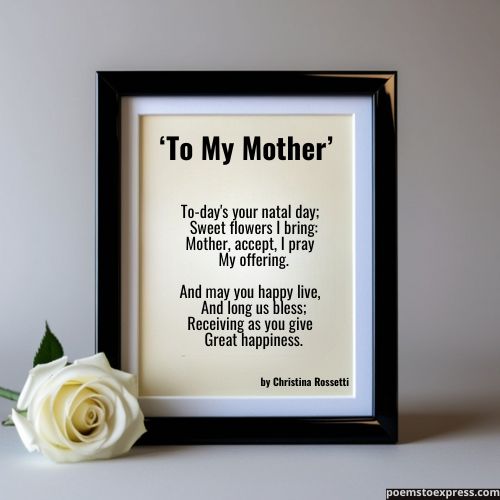
4) Morning Song by Sylvia Plath
The poem explores motherhood from an intimate and realistic perspective, highlighting the complexity of emotions faced by a first-time mother.
Initially, the mother feels disconnected from the baby, referring to him almost as an object rather than a human being.
As the poem progresses, this perception changes, and the narrator begins to develop a deeper emotional bond with her child, as evidenced by her responses to his crying and breathing during the night.
Love set you going like a fat gold watch.
The midwife slapped your footsoles, and your bald cry
Took its place among the elements.
Our voices echo, magnifying your arrival. New statue.
In a drafty museum, your nakedness
Shadows our safety. We stand round blankly as walls.
I’m no more your mother
Than the cloud that distills a mirror to reflect its own slow
Effacement at the wind’s hand.
All night your moth-breath
Flickers among the flat pink roses. I wake to listen:
A far sea moves in my ear.
One cry, and I stumble from bed, cow-heavy and floral
In my Victorian nightgown.
Your mouth opens clean as a cat’s. The window square
Whitens and swallows its dull stars. And now you try
Your handful of notes;
The clear vowels rise like balloons.
5) “First Fall” by Maggie Smith
“First Fall” by Maggie Smith is a poem that captures the experience of a mother teaching her young daughter about the changing seasons, particularly autumn.
During a walk in the park, the mother points out and names elements of the natural environment, such as trees and leaves changing color, introducing the child to the beauty and transience of the world around her.
The poem highlights the mother’s hope that her daughter will learn to love the world with all its complexities and beauties, a common desire in the mother-daughter relationship.
I’m your guide here. In the evening-dark
morning streets, I point and name.
Look, the sycamores, their mottled,
paint-by-number bark. Look, the leaves
rusting and crisping at the edges.
I walk through Schiller Park with you
on my chest. Stars smolder well
into daylight. Look, the pond, the ducks,
the dogs paddling after their prized sticks.
Fall is when the only things you know
because I’ve named them
begin to end. Soon I’ll have another
season to offer you: frost soft
on the window and a porthole
sighed there, ice sleeving the bare
gray branches. The first time you see
something die, you won’t know it might
come back. I’m desperate for you
to love the world because I brought you here.
6) ‘My Mother’ by Ann Taylor
The poem “My Mother” by Ann Taylor explores the deep gratitude and admiration a daughter feels for her mother, emphasizing maternal care and sacrifices.
Through a question-and-answer structure, Taylor evokes the mother’s constant and loving presence in various life situations, from childhood to adulthood.
The poem reflects the emotional security the mother provides and how these foundational actions form the basis of a strong and loving mother-daughter relationship.
Who sat and watched my infant head
When sleeping on my cradle bed,
And tears of sweet affection shed?
My Mother.
When pain and sickness made me cry,
Who gazed upon my heavy eye,
And wept for fear that I should die?
My Mother.
Who taught my infant lips to pray
And love God’s holy book and day,
And walk in wisdom’s pleasant way?
My Mother.
And can I ever cease to be
Affectionate and kind to thee,
Who wast so very kind to me,
My Mother?
Ah, no! the thought I cannot bear,
And if God please my life to spare
I hope I shall reward they care,
My Mother.
When thou art feeble, old and grey,
My healthy arm shall be thy stay,
And I will soothe thy pains away,
My Mother.
7) “The Raincoat” by Ada Limón
This poem offers a poignant perspective on the mother-daughter relationship, highlighting the subtle sacrifices and expressions of a mother’s love.
The poem reaches an emotionally resonant moment when the author, now an adult, deeply understands and appreciates her mother’s gestures.
This intimate portrayal emphasizes the love and gratitude that evolve over time within the mother-daughter bond.
When the doctor suggested surgery
and a brace for all my youngest years,
my parents scrambled to take me
to massage therapy, deep tissue work,
osteopathy, and soon my crooked spine
unspooled a bit, I could breathe again,
and move more in a body unclouded
by pain. My mom would tell me to sing
songs to her the whole forty-five minute
drive to Middle Two Rock Road and forty-
five minutes back from physical therapy.
She’d say, even my voice sounded unfettered
by my spine afterward. So I sang and sang,
because I thought she liked it. I never
asked her what she gave up to drive me,
or how her day was before this chore. Today,
at her age, I was driving myself home from yet
another spine appointment, singing along
to some maudlin but solid song on the radio,
and I saw a mom take her raincoat off
and give it to her young daughter when
a storm took over the afternoon. My god,
I thought, my whole life I’ve been under her
raincoat thinking it was somehow a marvel
that I never got wet.
8) “The Daughter” by Carmen Giménez
The poem “The Daughter” by Carmen Giménez Smith explores the complexity of the mother-daughter relationship through profound and contemplative poetic imagery.
The poem highlights the mother’s admiration for her daughter’s individuality and her acceptance of her own role in her daughter’s growth.
Its approach offers insight into both generational continuity and personal transformation within the mother-daughter dynamic.
We said she was a negative image of me because of her lightness.
She's light and also passage, the glory in my cortex.
Daughter, where did you get all that goddess?
Her eyes are Neruda's two dark pools at twilight.
Sometimes she's a stranger in my home because I hadn't imagined her.
Who will her daughter be?
She and I are the gradual ebb of my mother's darkness.
I unfurl the ribbon of her life, and it's a smooth long hallway, doors flung open.
Her surface is a deflection is why.
Harm on her, harm on us all.
Inside her, my grit and timbre, my reckless.
9) “Pheidippedes’ Daughter” by Gillian Clarke
The poem explores a daughter’s growth and independence through the symbolism of running and athletics.
The daughter, whose childhood was marked by health challenges symbolized by the use of an inhaler, grows to overcome physical obstacles and achieve her own milestones.
This poem celebrates personal transformation and empowerment, comparing the daughter’s journey to the legendary Marathon run of Pheidippides, emphasizing a legacy of resilience and triumph.
Long silver girl who slipped easy
and early from the womb’s waters,
whose child-breath was a bird in a cage,
the inhaler in her fist her amulet,
grew tall, beautiful, caught her breath,
outran the hound, the hare, the myth,
the otter, salmon, swallow, hawk,
the river, the road, the track.
She texts again – this time Santiago.
She’s counting seven cities underfoot,
running the bloodlines of language, lineage,
for Ceridwen’s drop of gold, an ear of corn,
to leave the Battle of Marathon and run
through pain and joy with news to the gates of a city,
to arrive at the finishing line, and say,
‘Nenikékamen – We have won.’
10) ‘Mother’ by Lola Ridge
This poem deeply reflects the transformative influence of a mother on her daughter’s perception of the world and herself.
The mother-daughter relationship is explored through the power of maternal love to reshape the harshness of life into something beautiful, emphasizing how a mother can profoundly impact her daughter’s self-esteem and self-concept.
Your love was like moonlight
turning harsh things to beauty,
so that little wry souls
reflecting each other obliquely
as in cracked mirrors . . .
beheld in your luminous spirit
their own reflection,
transfigured as in a shining stream,
and loved you for what they are not.
You are less an image in my mind
than a luster
I see you in gleams
pale as star-light on a gray wall . . .
evanescent as the reflection of a white swan
shimmering in broken water.
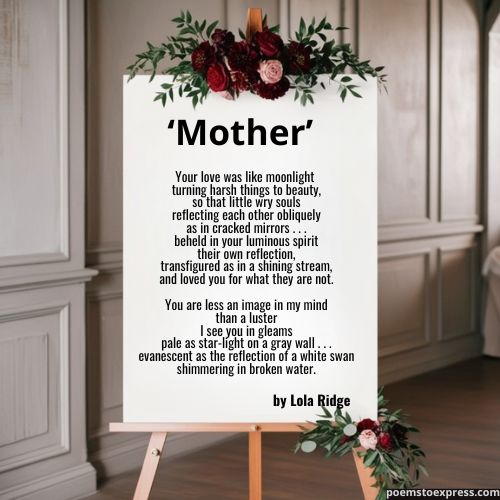
Themes in Mother Daughter Poems
1. Love and Affection
One of the most prominent themes in mother daughter poems is the deep love and affection shared between them.
These poems often highlight the unconditional love a mother has for her daughter and vice versa. They capture tender moments, expressions of care, and the emotional bonds that tie them together.
For example, in many poems, mothers express their pride and joy in their daughters’ achievements, while daughters reflect on the nurturing and support, they have received from their mothers.
2. Growth and Change
Another significant theme is the growth and change that both mothers and daughters experience over time.
These poems can trace the journey from childhood to adulthood, illustrating how the relationship evolves. They often discuss milestones such as growing up, leaving home, and becoming independent.
This theme can also include the role reversal that sometimes happens as daughters become caretakers for their aging mothers.
3. Conflict and Resolution
The mother-daughter relationship is not without its conflicts. Poems that explore this theme often delve into misunderstandings, disagreements, and generational gaps.
They can portray the struggles for independence, differences in values, and the emotional turmoil that sometimes arises.
However, these poems also frequently highlight the resolution of conflicts, showcasing forgiveness, understanding, and reconciliation.
4. Legacy and Memory
These poems often reflect on the heritage and traditions passed down from mothers to daughters.
They celebrate the wisdom, values, and life lessons imparted by mothers. Additionally, poems in this theme may deal with the memories of mothers who have passed away, capturing the lasting impact they have had on their daughters’ lives.
You might also like:


